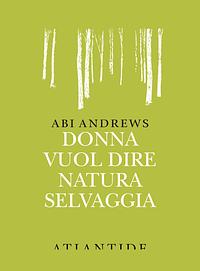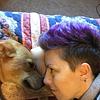Take a photo of a barcode or cover
I intend to re-read this later down the line as it was extremely poignant at times and once I have had time to digest it I feel it will make a lasting impression on my outlook on life. I haven't given it as high a rating as I think it deserves really as I found it quite difficult subject matter, so it may well be a book that I just was not ready to read currently.
I do feel like I learnt some really interesting facts/themes that I knew very little about before hand (e.g. Rachel Carson/Silent Spring, Henrietta Lacks, Letters of Last Resort, Chris McCandless, Unabomber, Caribou/Reindeer!) and so value that, but I found the main character a little unbelievable and the narrative quite jarring at times (this may be just the diary-style format).
Really recommend Rebecca Solnit's A Field Guide for Getting Lost to any fans of this book.
I do feel like I learnt some really interesting facts/themes that I knew very little about before hand (e.g. Rachel Carson/Silent Spring, Henrietta Lacks, Letters of Last Resort, Chris McCandless, Unabomber, Caribou/Reindeer!) and so value that, but I found the main character a little unbelievable and the narrative quite jarring at times (this may be just the diary-style format).
Really recommend Rebecca Solnit's A Field Guide for Getting Lost to any fans of this book.
I do not understand why this book isn’t being spoken about more. It’s one of the best things I’ve ever read. It’s contemporary eco-feminism, with a narrator who learns of her own biases and is supremely intelligent. The first half of the book feels like a (naive) travel memoir, and the second half of the book reads like your life is actually changing. If you want to reignite your passion for the world and for life and for presence, read this wonderful book. I cannot speak highly enough of this.
adventurous
dark
emotional
inspiring
reflective
medium-paced
Plot or Character Driven:
A mix
Strong character development:
Yes
Loveable characters:
Complicated
Diverse cast of characters:
Yes
Flaws of characters a main focus:
Complicated
adventurous
funny
hopeful
inspiring
lighthearted
reflective
slow-paced
Plot or Character Driven:
A mix
Loveable characters:
Yes
Diverse cast of characters:
No
Flaws of characters a main focus:
No
adventurous
challenging
dark
sad
slow-paced
Strong character development:
Complicated
Loveable characters:
No
Diverse cast of characters:
No
Flaws of characters a main focus:
Yes
Alaska
Graphic: Rape, Suicide
slow-paced
Strong character development:
No
Loveable characters:
No
Diverse cast of characters:
No
Flaws of characters a main focus:
Yes
This is a very ambitious, unconventional novel. Part gap year travel diary of sorts, part coming of age/self-discovery/right of passage journey, and also part philosophical, societal and mythical self-conscious musings and meditations. The Guardian review (https://www.theguardian.com/books/2018/feb/02/word-for-woman-is-wilderness-abi-andrews-review) described the narration as both “a pleasure and an annoyance”, which I largely agree with. It doesn’t follow the rules and it certainly doesn’t read like fiction and yet I don’t believe that this narrator can be real with all of her contradictions. I didn’t have the Guardian reviewers issues with the novel’s integrity on this point though - what 19-year-old out in the world isn’t conflicted and contradictory?
"The disconnection between Andrews’ scholarliness and the constructed naivety of her narrator creates a gap that sometimes threatens the novel’s integrity."
"The disconnection between Andrews’ scholarliness and the constructed naivety of her narrator creates a gap that sometimes threatens the novel’s integrity."
Maybe being closer in age gives me a different understanding on that front; the reviewer says as much. Opinionated, questioning and intellectual are easy as a 19-year-old when it is not required of you to have the complete answers yet.
I’m not sure what this book set out to be (the scope of it is so broad), and I’m not sure if it worked for me. It certainly dragged on, but I’m so curious about it, yet I couldn’t say I “liked” it. I am not ambivalent about as I have been with other books of a similar nature (Less comes to mind), but rather uncertain and conflicted by my response. Rather like the reviewer at the White Review (https://www.thewhitereview.org/reviews/abi-andrewss-word-woman-wilderness/), I’m just unsure about it all - is the author playing with her character, her reader, the genre, society? Is she even playing at all?
I’m not sure what this book set out to be (the scope of it is so broad), and I’m not sure if it worked for me. It certainly dragged on, but I’m so curious about it, yet I couldn’t say I “liked” it. I am not ambivalent about as I have been with other books of a similar nature (Less comes to mind), but rather uncertain and conflicted by my response. Rather like the reviewer at the White Review (https://www.thewhitereview.org/reviews/abi-andrewss-word-woman-wilderness/), I’m just unsure about it all - is the author playing with her character, her reader, the genre, society? Is she even playing at all?
I have never read anything quite like this book before. A curious and entertaining exploration of womanhood and wilderness, feminism and environmentalism, told in an original and engaging way. It is funny and thought provoking - a reclamation of woman’s place in the wild and a reminder to tread boldly but gently. I loved it.
DNF - 2/3 of the way through
y’all I have a lot of feels on this. Guilt, disappointment, confusion - just to name a few. This is my first DNF on this account and frankly only my second this year. This book had everything going for it but wow I just could not follow the plot well enough to finish, let alone enjoy it.
TWFWIW follows British teen Erin as she embarks across a cross continental journey from England to the Alaskan Yukon. Looking to reenact Jack Kerouac’s On The Road from a feminist lens - Andrews beautifully echoes the chaotic journey with a heroine.
But while the book was beatnik in style, its a beating to read. Unceasingly rotating between theory, stream of consciousness and lucid dreams, I struggled understanding what was reality and what was fiction. In addition, Erin’s l nativity and reckless hitchhiking to save a few dollars was like watching a puppy fall down a flight of stairs. Getting 2/3 of the way through we finally see Erin arrive in the Yukon and start “experiencing” nature. But at that point, my attention and endurance has been zapped. I picked this up expecting an adventure novel, and got a philosophical treatise instead.
y’all I have a lot of feels on this. Guilt, disappointment, confusion - just to name a few. This is my first DNF on this account and frankly only my second this year. This book had everything going for it but wow I just could not follow the plot well enough to finish, let alone enjoy it.
TWFWIW follows British teen Erin as she embarks across a cross continental journey from England to the Alaskan Yukon. Looking to reenact Jack Kerouac’s On The Road from a feminist lens - Andrews beautifully echoes the chaotic journey with a heroine.
But while the book was beatnik in style, its a beating to read. Unceasingly rotating between theory, stream of consciousness and lucid dreams, I struggled understanding what was reality and what was fiction. In addition, Erin’s l nativity and reckless hitchhiking to save a few dollars was like watching a puppy fall down a flight of stairs. Getting 2/3 of the way through we finally see Erin arrive in the Yukon and start “experiencing” nature. But at that point, my attention and endurance has been zapped. I picked this up expecting an adventure novel, and got a philosophical treatise instead.
adventurous
informative
reflective
medium-paced
Strong character development:
Yes
Loveable characters:
No
Flaws of characters a main focus:
Yes
Moderate: Sexual assault
Strong character development:
No
Loveable characters:
No
Diverse cast of characters:
No
Flaws of characters a main focus:
N/A
Me costó mucho terminar de leer Tundra, como se titula este libro en la edición argentina. Tenía expectativas bastante altas y pedí el libro como regalo para mi cumpleaños, pero tengo que decir que no me gustó. Creo que entiendo lo que quiso hacer la autora, entiendo el enfoque feminista y ecológico que quiso darle a la historia, pero, en mi opinión, no logra hacer que la novela funcione.
Primero, el libro se va demasiado por las ramas. A mí me gustan muchos libros que no se enfocan en la trama, sino más bien en el personaje, la ambientación, los pensamientos y paisajes, pero en el caso de Andrews ya es demasiado. Todo es súper disperso, va y viene sobre temas que no tienen mucho que ver entre sí y termina provocando un poco de dolor de cabeza tanto ir y venir. Pareciera que al libro le falto un proceso de edición más riguroso. Andrews escribe mucho pero dice poco.
Luego, el tema del enfoque feminista. Yo me considero feminista y es algo sumamente importante para mí, pero hay cosas que plantea la narradora de Tundra que no comparto. Asegura que su viaje y su intento de documental serán un logro para todas las mujeres, digno de acabar en una cápsula de tiempo, a lo cual mi reacción fue: de qué carajo estás hablando? El feminismo es un movimiento colectivo, es una lucha colectiva, por ende, el viaje que pueda hacer una piba no va a ser un logro para nadie más que para ella misma. La protagonista es demasiado egocéntrica y piensa constantemente hacia dentro, únicamente sobre sí misma y su propia importancia. De hecho, los encuentros que tiene con otras mujeres a lo largo de la historia me dejaron con sabor a nada, irrelevantes. Además, ¿por qué me importaría tanto lo que tiene para decir sobre las comunidades nativas norteamericanas una chica blanca inglesa de 19 años y de clase media? Hay una parte en la que firma una carta como "reina de las tierras salvajes" y me dio un poco de vergüenza ajena, lo lamento.
Por otro lado, los personajes no tienen vida. La autora perdió el 50% de la novela citando cientos y cientos de personas muertas, por lo que cuando se trata de los personajes que se supone están vivos, no tienen profundidad ni personalidad ni nada. Son simples monigotes sin cara con los que Erin, la protagonista se va encontrando. Y no ayuda que Erin, el único personaje con algo de personalidad, sea tan pedante y esté tan metida en su burbuja. Y ni siquiera se qué decir sobre su extraña admiración por el Unabomber, un hombre que, si bien fue víctima en ciertos aspectos, también hirió gravemente y afectó la vida de personas inocentes porque sí.
En fin, no sé. Entiendo que es una primera novela y que la autora es joven, empatizo con el hecho de que quiso abordar determinadas ideas desde una perspectiva feminista. Hay un par de frases interesantes que marqué, no es todo un desastre, pero, para mí, deja mucho que desear.
En la página 79, la narradora dice: "Me está resultando difícil separar las cosas que quieren decir algo de las cosas que no. También es difícil encontrar cosas que digan lo que yo quiero que digan". Qué curioso, me parece que la autora tiene el mismo problema.
Primero, el libro se va demasiado por las ramas. A mí me gustan muchos libros que no se enfocan en la trama, sino más bien en el personaje, la ambientación, los pensamientos y paisajes, pero en el caso de Andrews ya es demasiado. Todo es súper disperso, va y viene sobre temas que no tienen mucho que ver entre sí y termina provocando un poco de dolor de cabeza tanto ir y venir. Pareciera que al libro le falto un proceso de edición más riguroso. Andrews escribe mucho pero dice poco.
Luego, el tema del enfoque feminista. Yo me considero feminista y es algo sumamente importante para mí, pero hay cosas que plantea la narradora de Tundra que no comparto. Asegura que su viaje y su intento de documental serán un logro para todas las mujeres, digno de acabar en una cápsula de tiempo, a lo cual mi reacción fue: de qué carajo estás hablando? El feminismo es un movimiento colectivo, es una lucha colectiva, por ende, el viaje que pueda hacer una piba no va a ser un logro para nadie más que para ella misma. La protagonista es demasiado egocéntrica y piensa constantemente hacia dentro, únicamente sobre sí misma y su propia importancia. De hecho, los encuentros que tiene con otras mujeres a lo largo de la historia me dejaron con sabor a nada, irrelevantes. Además, ¿por qué me importaría tanto lo que tiene para decir sobre las comunidades nativas norteamericanas una chica blanca inglesa de 19 años y de clase media? Hay una parte en la que firma una carta como "reina de las tierras salvajes" y me dio un poco de vergüenza ajena, lo lamento.
Por otro lado, los personajes no tienen vida. La autora perdió el 50% de la novela citando cientos y cientos de personas muertas, por lo que cuando se trata de los personajes que se supone están vivos, no tienen profundidad ni personalidad ni nada. Son simples monigotes sin cara con los que Erin, la protagonista se va encontrando. Y no ayuda que Erin, el único personaje con algo de personalidad, sea tan pedante y esté tan metida en su burbuja. Y ni siquiera se qué decir sobre su extraña admiración por el Unabomber, un hombre que, si bien fue víctima en ciertos aspectos, también hirió gravemente y afectó la vida de personas inocentes porque sí.
En fin, no sé. Entiendo que es una primera novela y que la autora es joven, empatizo con el hecho de que quiso abordar determinadas ideas desde una perspectiva feminista. Hay un par de frases interesantes que marqué, no es todo un desastre, pero, para mí, deja mucho que desear.
En la página 79, la narradora dice: "Me está resultando difícil separar las cosas que quieren decir algo de las cosas que no. También es difícil encontrar cosas que digan lo que yo quiero que digan". Qué curioso, me parece que la autora tiene el mismo problema.
Graphic: Animal death, Misogyny, Sexism, Suicidal thoughts






